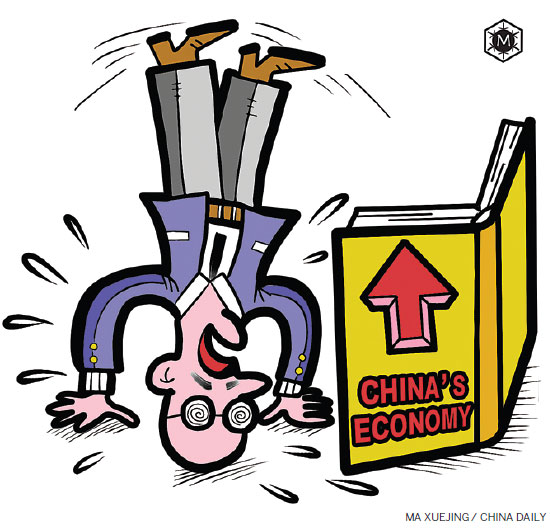Moody's missive fails to change market mood
Updated: 2016-03-06 08:54
By Mei Xinyu(China Daily)
|
|||||||||

Despite maintaining the Chinese government's debt rating at Aa3, Moody's cut the outlook on China from stable to negative on Wednesday, a move that means it could downgrade China's credit rating in the medium term. But defying the lowered outlook on China, the yuan's exchange rate remained stable and Asian stock markets ended positive on Wednesday. In fact, the Shanghai Composite Index ended up 4 percent to more than 2,800 points.
The operation of modern financial markets and their regulation depend highly on credit rating agencies, and financial regulation is aimed at creating favorable conditions to strengthen market discipline. But the precondition of effective market discipline is full information disclosure based on unified accounting criteria and credit rating instruments.
Because of their status in the global credit rating circle and the impact of their rating results on the global financial market, credit rating agencies such as Moody's and Standard & Poor's usually cause a country's stocks and exchange markets to tumble and fuel panic by downgrading its sovereign credit rating. If the downgrading involves a major economy, such panic usually spreads to other countries in the region, even beyond.
The muted market response to Moody's negative outlook on China reflects the credit rating agency's weakening influence on the market, especially because its ratings may not be based on objective standards. Owing to its misperceptions on China, Moody's has failed to win extensive endorsements for its negative outlook on the country. Even the most risk-sensitive securities portfolio investors have reacted coldly to its announcement.
Moody's said its negative outlook resulted from China's rising government debt, its declining foreign reserves and growing uncertainties over reforms. But this perception of Chinese government's rising debt is wrong.
China is very different from the United States, European countries, Japan and other emerging economies in terms of sovereign debt, because a large part of its government expenditures have gone into investment. This means the Chinese government's debts are correspondingly linked to assets. As a result, even the same ratio of government debts will be a lighter burden on and less of a security concern for China, compared with other countries.
Related Stories
Moody's China outlook downgrade does not tally with facts 2016-03-04 10:13
China market's gradual opening credit positive for foreign asset managers: Moody's 2016-02-27 17:31
New growth drivers key to success of China's reforms: Moody's 2015-12-02 13:35
Chinese property sector sales momentum to continue: Moody's 2015-10-29 16:55
China's latest rate cuts to pump liquidity up to 700b yuan: Moody's 2015-08-28 09:09
China's stock turbulence has limited spillover effect on real economy: Moody's 2015-07-16 15:22
Today's Top News
Inspectors to cover all of military
Britons embrace 'Super Thursday' elections
Campaign spreads Chinese cooking in the UK
Trump to aim all guns at Hillary Clinton
Labour set to take London after bitter campaign
Labour candidate favourite for London mayor
Fossil footprints bring dinosaurs to life
Buffett optimistic on China's economic transition
Hot Topics
Lunar probe , China growth forecasts, Emission rules get tougher, China seen through 'colored lens', International board,
Editor's Picks

|

|

|

|

|

|







